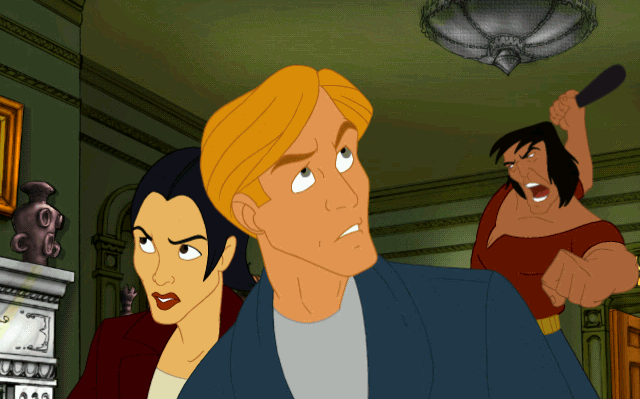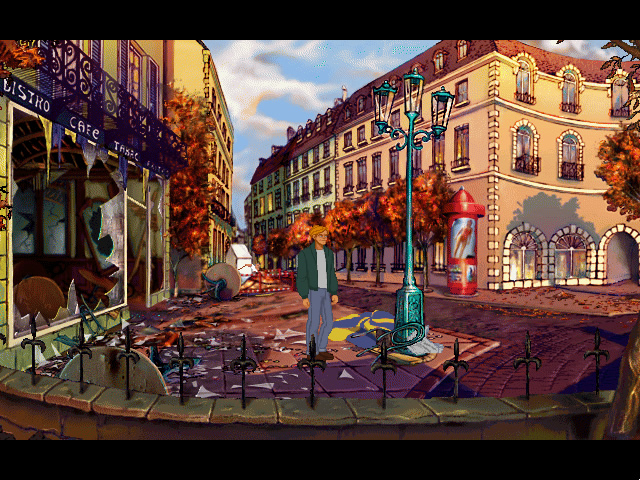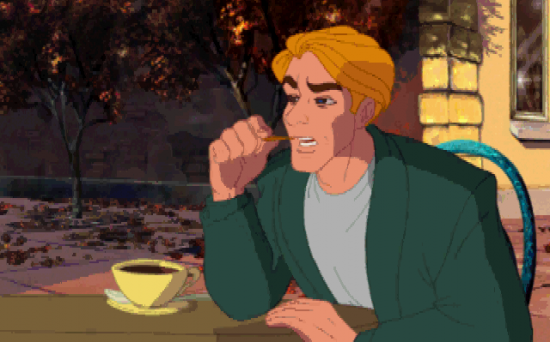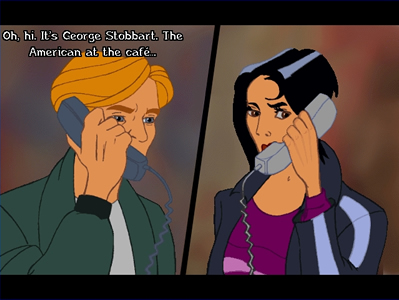Why I love Broken Sword's sense of humour
A joke walks into a videogame...


In Why I Love, PC Gamer writers pick an aspect of PC gaming that they love and write about why it's brilliant. Today, Joe looks back and laughs.
In an interview with Edge magazine back in May 2013, Irish comedian and videogame enthusiast Dara O'Briain—who often works videogame-related material into his stand up routines—spoke of how few games tackle comedy nowadays. Citing Portal as his then most recent example of comedy-done-well, he suggested writing is key to delivering credible humour and that while "you probably don't want a comedy game, there's no reason why you shouldn't bounce [comedy] off it."
O'Briain speaks of how, from his point of view four years ago, the industry had a tendency towards the 'dream sequence' concept where animators have the chance to flex their imaginative muscles. While he enjoyed games such as Dear Esther and Journey, there was little amusing happening from a contemporary perspective. "If you do something funny," he said, "like 'the cake is a lie', then people will thank you for it forever—Valve will never quite live down how great that was."
Portal is a great example of comedy in games—GLaDOS is easily one of the smartest and funniest videogame characters of all time—as is The Stanley Parable by virtue of its wonderful and equally deceptive omnipresent narrator. Grand Theft Auto's relentlessly satirical tongue-and-cheek swipes at the modern age often oscillate between funny and cringeworthy; and any one of LucasArts' classics is littered with jokes and puns. Yet no game has tickled my funny bone in quite the same way Revolution Software's Broken Sword did—both when I first played in 1996, and when I revisited it and its 1997 The Smoking Mirror sequel last year.

"The sergeant was a scrawny man in his 50s who resembled a constipated chicken," is the first gag from protagonist George Stobbart that prepubescent me would've found hilarious. Stobbart's sense of humour is often observational, much of which is projected via his methodological thought processes and internal monologues.
Granted I found wisecracks like the above less funny upon returning as an adult, however did find the game's more sophisticated, slightly more mature humour more appealing in turn. I realised few games have struck such a perfect balance between comedy and intuitive mechanics since—something which is most prevalent when Stobbart's witticisms are received by the game's (and subsequent series') desultory and equally sharp-witted cast of NPCs.
"He was a pear-shaped guy with a fine display of multiple chins."
"The fish was wet and slimy, and decidedly dead."
The biggest gaming news, reviews and hardware deals
Keep up to date with the most important stories and the best deals, as picked by the PC Gamer team.
"I felt a slight twinge of conscience as I prepared to give the dog a dunking. It soon passed."
"He had the eyes of a cocker spaniel set in a face like a deflated soufflé."

These are but a few of Stobbart's one-liners which still amuse today. And it gets better when in conversation with others (thanks to IMDB):
Stobbart: Let's just say I'm working in the interests of truth and justice.
Todryk (a local tailor): Ah, Thank God, I thought you were the police.
Stobbart: You speak very good English for a French girl.
Nicole Collard (a journalist): Thanks. You speak very good English for an American.
Moue (a police officer): [pointing a gun at George] Freeze! Hold it... right there!
Stobbart: Woah! Don't shoot! I'm innocent! I'm an American!
Moue: Can't make up your mind, huh?
Stobbart: How did you and Rosso arrive at the scene so quickly? Was it a tip-off?
Moue: Inspector Rosso's sources are a mystery to me, m'sieur. Some say, he has made a pact with the devil.
Stobbart: What do you think?
Moue: I think, he IS the devil.
Stobbart: Look Sergeant, the Inspector gave me his card.
Moue: Yes, m'sieur. He wants you to advise him if you have any information concerning this case.
Stobbart: Well, I'd be glad to talk with him, but I don't want him working his psycho-weirdness on me.
Moue: Ah! Non, monsieur, you are confusing the science of parapsychology with witchcraft.
Stobbart: Oh yeah? What's the difference?
Moue: We don't do sacrifices.

While writing about Broken Sword's origins last year, I caught up with series mastermind Charles Cecil and asked him specifically about humour and he and his team's ability to deliver funny jokes. This quote didn't make it into the final article, however speaks directly to where much of the humour came from: the late writer Dave Cummins.
"Really a lot of the first four games—Lure of the Temptress, Beneath a Steel Sky and the first two Broken Sword games—were a juxtaposition as myself as the lead designer and writer, and a writer named Dave Cummins," Cecil explained. "Dave had actually been a games tester at Activision with me, he’d worked for me in the test department, and he used to write beautifully. I remember one of his test reports on a particular adventure was so much better written than the adventure itself—it was extraordinarily ironic.
"When Activision collapsed I offered him a job and I was writing the more serious stuff with a fairly obvious sense of humour, but he had a really dry acerbic wit. A lot of those lines for George came straight from his head. Dave passed away a number of years ago but I’m keen to give him full credit for a lot of the dialogue in those early games."
Some of Cummins' writing was vetoed along the way, admits Cecil, but "those very clever, witty lines very much came from the mind of Dave."
The Broken Sword series celebrated its 20th year anniversary in 2016, and the fact that its humour and ability to deliver genuinely funny comedy some two decades on is still being spoken about today is testament to Cummins, Cecil and Revolution's writing prowess. George Stobbart is certainly the funniest videogame character I've ever met, and it'll take someone pretty special to come along for that to change.

